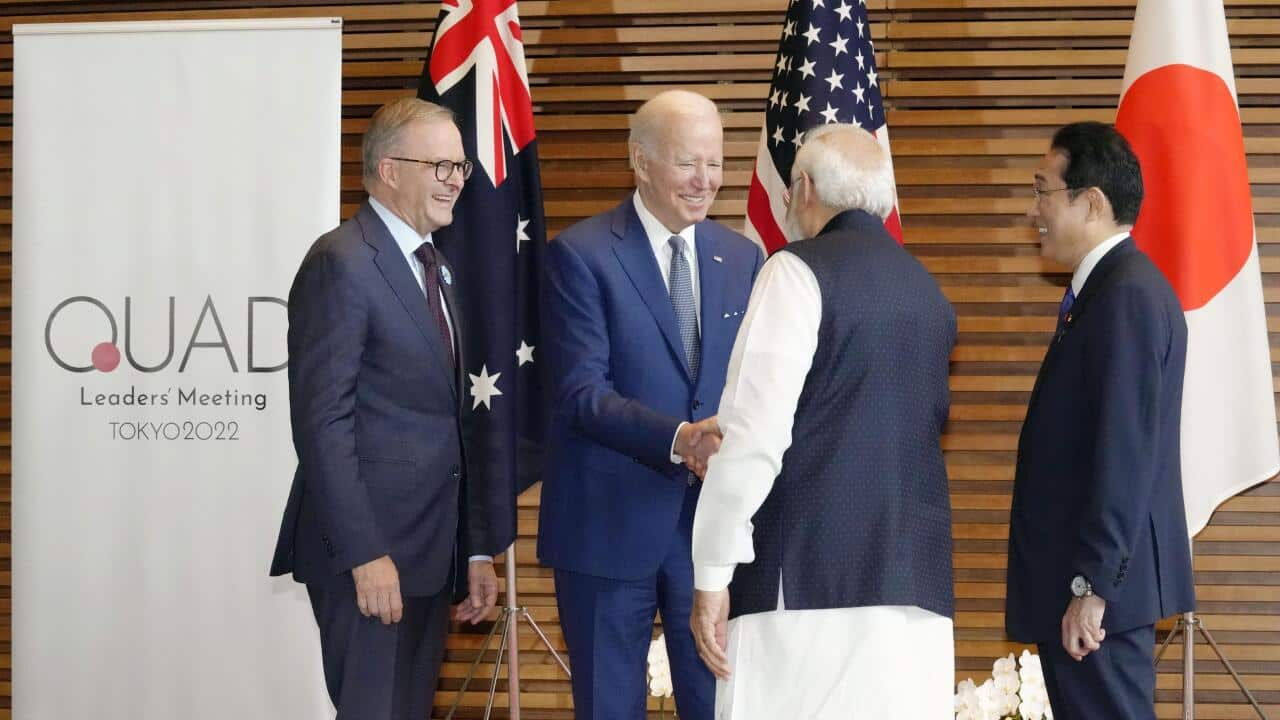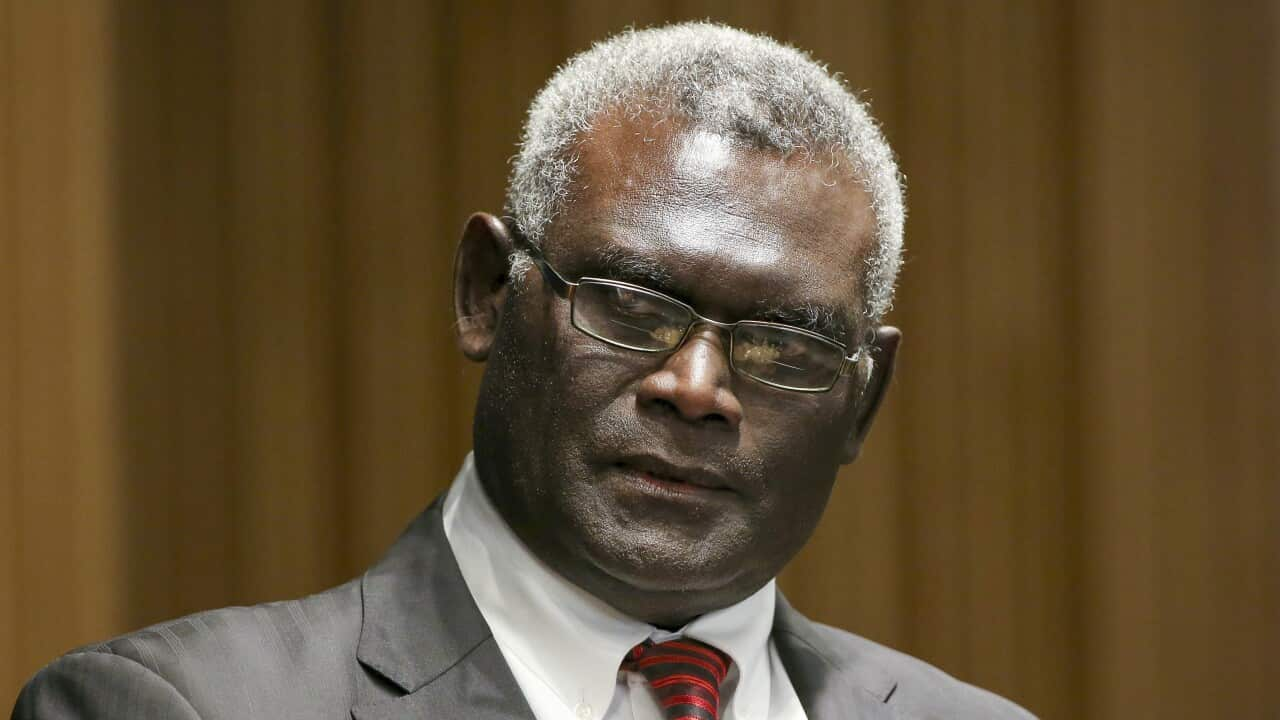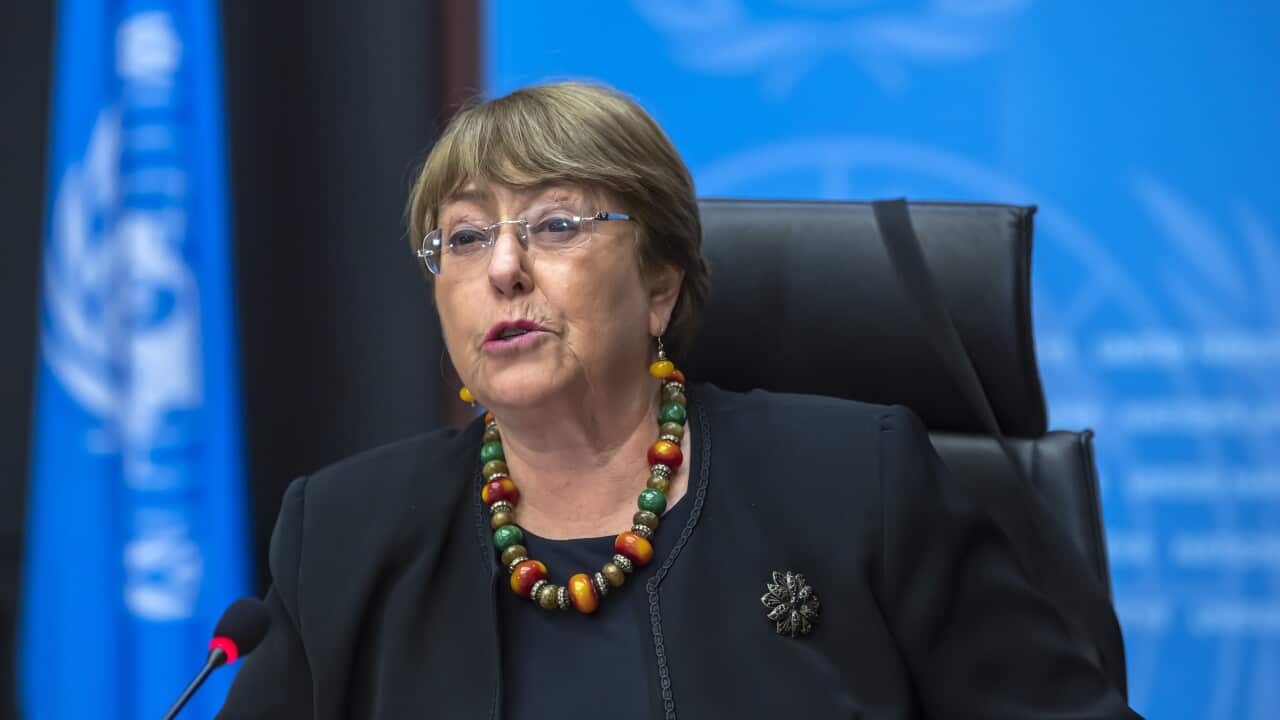Anthony Albanese's first appearance on the world stage as prime minister for high-level meetings with leaders from the United States, Japan and India has addressed the need for the alliance to work more closely in the Indo-Pacific region to counter China's influence.
Mr Albanese has been in Tokyo for the meeting of the Quadrilateral Security Dialogue (Quad) using the visit to promote his new government's commitment to maintaining the alliance, and pledging a more ambitious approach to climate change policy under his leadership.
But away from the scripted remarks, s has been a critical line of discussion, particularly what action could be contemplated if China was to establish a military base in the South Pacific nation.
Mr Albanese was asked about the prospect of conflict in the region after receiving high-level briefings from officials - something that members of the previous Morrison government had shared warnings about.
"We want peace and stability in the region - that’s best achieved through proper diplomatic processes and making sure we build relations in the region," he said.
Mr Albanese said Solomon Islands was discussed in the context of China "seeking to exert more influence in the Pacific" during his talks with United States President Joe Biden, Japanese Prime Minister Fumio Kishida and India’s Prime Minister Narendra Modi.
"We discussed the need for the Quad to engage more in the Indo-Pacific that was a general theme how do we make sure we push our shared values in the region at a time when China is clearly seeking to exert more influence," he said.
Mr Albanese will also hold bilateral meetings with the leaders on Tuesday, who he said had welcomed his government's proposal to take stronger action on climate change than the previous Morrison government.
The approach of the Morrison government had previously been a point of tension with the Biden administration that has led global calls for countries to embrace more ambitious action on climate change.
Australia to host Quad security summit next year
Mr Albanese has also confirmed Australia will host leaders of the Quad next year.
He earlier addressed his counterparts with opening remarks ahead of the meeting signalling his new government's intention to maintain its commitment to the alliance.
"As we gather today, I acknowledge all that the Quad has achieved," he said in his opening remarks in Tokyo.
"Standing together for a free, open, and resilient Indo-Pacific region, and working together to tackle the biggest challenges of our time, including climate change and the security of our region."
Mr Albanese, who was sworn in as prime minister on Monday, said he would continue to stand with like-minded allies as Australia puts a renewed focus on Indo-Pacific and Southeast Asia.
"Our cooperation is built on the values that we share - a commitment to representative democracy, the rule of law and the right to live in peace," he said.
"We will stand firm on our values and our beliefs, on what we know will enhance the prosperity and stability of our region and what is firmly in the interests of all those who call the Indo-Pacific home."
"We will bring more energy and resources to securing our region as we enter a new and more complex phase in the Pacific's strategic environment."
On top of regional security, the leaders' meeting will also focus on establishing supply chain principles, including discussions about human rights after the US passed legislation in December banning imports from China's Xinjiang region.
A similar push in Australia stalled under the Morrison government despite being recommended by a parliamentary foreign affairs committee.
There will also be a focus on telecommunications markets for 5G and 6G to counter Chinese dominance in the field as well as climate change, infrastructure needs and collaboration on disaster relief.
"You got sworn in, got on a plane and if you fall asleep while you're here, it's OK," he said.
The US president said the partnership was about democracy against autocracy.
"We're navigating a dark hour in our shared history. The Russian brutal war against Ukraine has triggered a humanitarian catastrophe," he said.
"The fundamental principles of international order, territorial integrity and sovereignty, international law, human rights, must always be defended, regardless where they're violated in the world."

Prime Minister Anthony Albanese, United States President Joe Biden, Indian Prime Minister Narendra Modi, and Japanese Prime Minister Fumio Kishida at the Quad Leaders Summit at Kantei in Tokyo on 24 May, 2022. Source: Getty, AFP / Saul Loeb
Asked by a reporter if the United States policy of strategic ambiguity towards the self-governed island was "dead", he replied "no".
Mr Albanese, when later questioned about Taiwan, also said "there should be no unilateral change to the status quo, our position has not changed."
Foreign Minister Penny Wong held bilateral discussions with her United States and Indian counterparts on the sidelines in Tokyo.
Senator Wong met with Subrahmanyam Jaishankar on Monday night after arriving in Tokyo on the same day as being sworn in, before meeting with Antony Blinken and the White House's top Indo-Pacific security advisor Kurt Campbell on Tuesday morning.
The meetings focused on Chinese influence in the Indo-Pacific, including through its new security agreement with Solomon Islands, as well as the challenges proposed by climate change.
"We discussed what was happening in the Pacific, the Solomon Islands and the importance of working together with other partners to secure the region," she said.
Mr Biden met with Mr Kishida on Monday where he unveiled the Indo-Pacific Economic Framework for Prosperity, which includes a dozen initial partners making up 40 per cent of the world's GDP. Partners include Australia, New Zealand, Japan, India, Indonesia, South Korea, Malaysia, the Philippines, Singapore, Thailand, Vietnam and Brunei.
It comes after Australia condemned Russia alongside the US and Japan in a seven-nation statement on Monday following APEC, where no joint statement was issued.
The official Quad communiqué is unlikely to expressly condemn Russia over its invasion of Ukraine. India has refused to outright condemn the invasion due to its close military trade with the Kremlin.
China indicates possible thawing in frosty relationship with Australia
Earlier, Beijing's state media reported Chinese premier Li Keqiang had sent a congratulatory note to Anthony Albanese, ending a year-long freeze in diplomatic contact between the two countries.
"The Chinese side is ready to work with the Australian side to review the past, look into the future... to promote the sound and steady growth of their comprehensive strategic partnership," Premier Li said, according to the state-run Xinhua news agency late on Monday.
Mr Albanese said he would respond to the letter from the Chinese government in an appropriate manner, but maintained he remained concerned about Beijing's exercising of economic coercion against Australia through its imposing of trade sanctions.
"Australia seeks good relations with all countries - but it’s not Australia that’s changed - it’s China that has placed sanctions on China," he said.
Tensions between the countries soared in the last two years after Canberra called for an independent probe into the origins of the coronavirus pandemic and banned telecoms giant Huawei from building Australia's 5G network.
China - Australia's biggest trading partner - responded by imposing tariffs or disrupting more than a dozen key industries, including wine, barley and coal.
- With AFP





